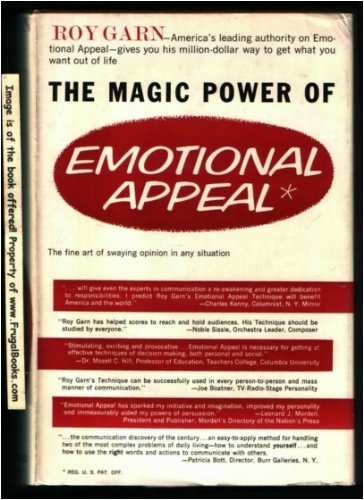There is really only one way to break a person’s preoccupation (without physical contact) and that is to appeal to their emotions. Emotional appeals come in four irresistible flavors: money, self-protection, recognition, and romance and are the topics discussed in this post.
Many people think that they are good multi-taskers, but the human brain is only capable of really focusing on one task at a time. When we think we are multitasking, we are actually switching from one task to another, creating the illusion of doing more than one task at the same time. When we encounter someone or something, we may suspend one task and direct our attention to another task.
However, we often don’t. My wife complains that I have selective hearing, but in fact, my mind is often just preoccupied and I never hear her. Most of the time we are preoccupied and filter out the rest of the world. Our ability to filter out distractions is part of our evolutionary success to allow us to focus our attention in the face of distractions.
It has been said that 99 out of 100 words spoken in a normal conversation are never heard by the other party. The one word that is heard was triggered by an emotional appeal. This emotional appeal commands your attention and is as real as a slap in the head. These emotional appeals or triggers are hardwired into your brain through millions of years of evolution. While these emotional appeals are a common denominator in all people, some emotional triggers carry more weight in some people than in others. With an understanding of emotional triggers, you will discover the difference between struggling to communicate and successfully communicating. By using words and actions associated with emotional appeals, you will notice that people react instantly to you with predictable regularity.
The 4 Emotional Appeals
In his groundbreaking book, “The Magic Power of Emotional Appeal,” Roy Garn explains that emotional appeals come in four irresistible flavors. Yet, many emotional appeals crossover. For example, exercise could be about self-preservation since it improves health. However, it may also be tied to romance because exercise can make you thinner and more fit, making you look more attractive to the opposite sex. It may also be tied to recognition if people notice your new physique. Exercise may even be tied to money because being healthier and having a better Body Mass Index (BMI) can lower life insurance and health care rates.
Money

All of us want to make more money or receive the equivalent in rewards of property or possessions. Everyone wants the security money can bring and wants to make more money with the least amount of effort. Thus we are all emotionally receptive to anyone that can tell us how to get more of it.
If you can make someone realize the profits they can make with your product, they will stop what they are doing and listen. Money is equally entrenched in the rich as it is in the poor, the educated and the uneducated, the petty thief and the drug lord. However, business owners are particularly focused on things that will make them money.
An emotional appeal of money refers to ways of either saving, buying, winning, investing, or earning money. My wife says that I’m so cheap that I squeak when I walk so for me savings is an effective emotional trigger.
The other day I was driving through a construction area. There was a sign that said “fines doubled in construction area” and a speed reader that displayed your speed next to the posted speed limit. The “fines doubled in construction area” was a clear emotional appeal tied to money. That said, the emotional appeal to money could have been better stated. What if the sign said, “Exceeding the speed limit equals a $250 fine plus 4 points on your license.”
Next time you are at an expo and want someone to stop what they are doing and come to your booth, just wave some money in the air. No one will be able to resist the money wave and they will want to know more.
Want to get people’s attention? I suggest you drop a handful of coins. People will stop what they are doing and look at you.
Each person’s money motivations may differ. I’m primarily motivated to save money, my wife and kids are motivated by ways to spend it, and my father-in-law was motivated by ways to win it since he spent a small fortune on lottery tickets.
Some popular emotional appeals to money that I have seen lately include:
Buy 3, Get 1 Free
How to Trade Stocks Like the Experts
The Secret Formula for Wealth Creation
Reward for Missing Dog
Some tactics involving the money emotional appeal include using a contest to get people to buy your product or asking people to drop their business card in a fishbowl in exchange for a chance to win something.
To break through a person’s preoccupation and get them to focus their attention on you, use the money emotional appeal. Emotional appeals to money include mentioning ways your customers can save money, capitalize on a limited-time buying opportunity, win a reward, make investments, or earn more money.
How can you use a person’s emotional connection to anything related to money to pay more attention to your marketing message?
Self-Preservation

If the radio in the background announces “killer running loose,” it will trigger a visceral reaction that appeals to your need for self-preservation. Without being hardwired for self-preservation, our species would never have lived long enough to repopulate the species.
Most religions are based on our desire for self-preservation. Even if that self-preservation is not in this life, then perhaps it will be in the next. The congregation often listens intently to an animated fire and brimstone sermon since it implies punishment and triggers the self-preservation emotion.
Crime can also appeal to the self-preservation emotional trigger. For example, a large retail store owner was having trouble with shoplifters. The owner tried to employ more security guards to catch the thief in the act, but it didn’t help. Criminals, like shoplifters, spend more time planning their escape and ways not to get caught than how to actually pull off the crime. So the store owner decided to appeal to the shoplifter’s self-preservation trigger and cleared an area in the middle of the store to create a comfortable seating area. He encouraged people to come in, relax, drink free coffee, and socialize with their friends in the area he created. Many people took him up on the invitation and the shoplifting stopped. Why you might ask, would a seating area curtail shoplifters? With all the people sitting in the middle of the store and lots of eyes looking in every direction, shoplifting in that store became too risky. The shoplifters were motivated by their own self-preservation and avoided the store since the risk of being spotted was dramatically increased.
In another example, a man was stopped at a streetlight when a panhandler came up to the window and asked if he had any money. Without even ever making eye contact with the panhandler, the driver simply said, “Beat it. I’m on duty,” and the panhandler disappeared into the darkness. The words “on duty” triggered his flight reaction.
My dad was a lifelong smoker and every time he went to the doctor, the doctor would recommend that my dad quit smoking. However, my dad kept on smoking. At a pre-op appointment for heart bypass surgery, the doctor asked if my dad had quit smoking yet. However, this time he added that if my dad didn’t stop smoking, he would be coughing after surgery. The fact that my dad’s sternum would be cut during the by-pass surgery would make the act of coughing horribly painful. Hearing that message, my dad quit smoking cold turkey after almost 60 years of smoking 2 packs a day.
Self-preservation extends to the protection of others too. If you have not noticed, guns and ammo have been flying off the shelves in recent years. I’m not talking about hunting rifles and ammo; I’m talking about handguns and bullets which are primarily used for home protection. In fact, as a reloader, I once had to wait for more than a year to purchase pistol gunpowder because as soon as the manufacturer produces it, it sold out.
In a related form of self-preservation, one of the fastest-growing industries today is providing supplies for survivalists, sometimes called “Doomsday Preppers.”
If you incorporate words into a conversation that trigger a self-preservation response, you are likely to snap a person out of their preoccupation and direct their attention toward your message. The message does not need to be literal; Instead, include more figurative or metaphoric statements to elicit a response. For example, you could have your slogan be “Don’t be left in the dark! Buy our widget.”
Some popular emotional appeals to self-preservation that I have seen lately include:
Top 5 Things to Save Your Company
The Secret to Living Longer
Pain-Free in Just 10 Days
Protect Your Assets with Life Lock
Protect Your Pet with Our Microchip
I’ve Fallen and Can’t Get Up
How can you incorporate self-preservation emotional appeals such as living longer, being safer, etc. into your marketing message?
Recognition

The desire for recognition exists in every person and every company. When we complete a task or project we hope for some appreciation and recognition for our efforts. Then, if it is not forthcoming, we feel hurt since our desire for recognition has been bypassed.
If a person craves recognition and you give it to them, they will like you and bend over backward to help you. However, if you make them look bad or take credit for what they did, watch out.
Mary Kay was the master of recognition and it propelled her company to greatness as we discussed in a previous blog called “Recognition on Steroids.” By contrast, the lack of recognition when it is due can create a Benedict Arnold as we discussed in a previous blog called “Recognition or Doom.”
The secret to making people like and pay attention to you, especially with people that crave recognition, is to make them feel a sense of importance. The simple act of active listening can make the other person feel more important. Show them you are interested in their troubles, their children, and their success. They will love this attention and pay you back in spades.
However, rather than make the other person feel more important, many people choose instead to play the sympathy card and complain about their health or some bad luck they had. They make the conversation about themselves, denying the other party the ability to fulfill their desire for recognition. Everyone has health issues and hard-luck stories.
Recognition can also come from meeting a challenge. For example, there is a story I think that came from Tom Peter’s book, “In Search of Excellence,” where a factory owner wanted to get the most out of his workers. He asked the day shift to produce as many widgets as they could. At the end of the day, he wrote in chalk on the floor by the employee entrance the number 8 since the day shift produced 8 widgets. When the night shift arrived, they saw the number 8 and asked what it meant. They were told that the day shift produced 8 widgets. The next morning, when the owner returned to work, his 8 was erased and the number 9 was written in its place by the night crew. Surely the night crew went home feeling very important that day.
Most of us like to find fault in others. When we belittle others, we attempt to inflate our own feelings of importance. However, if we regularly and unduly seek out and comment upon the faults of others, we are seen as lacking confidence in ourselves and are frequently ignored.
How can you use the emotional appeal of recognition to make your customers feel more important and thereby focus on your marketing message?
Romance

Humans are social creatures and most are hardwired with the desire to attract the opposite sex. Romance as an emotional appeal consists of sexual attraction and our desire for marriage or future promise. When we talk about romance, we are talking about an emotional connection rather than a sexual connection, which is related more to self-preservation.
I read news articles every day on various internet news sites. At the bottom of many articles are a bunch of taglines that push the romance trigger. While I might be reading an article about a presidential hopeful or something related to the economy, many published articles include links at the bottom with taglines like “10 Ways to Look Younger” and “Five Foods that Boost Testosterone.”
A recent Go Daddy Super Bowl ad featured a sexy woman and nerdy guy to evoke the romance trigger. Not to leave women out, A Kraft Super Bowl ad included a shirtless man making a salad with Kraft Zesty salad dressing. We are surrounded by ads that try to appeal to us romantically.
There is a story about a jewel thief that used her sex appeal to distract male jewelry salesmen. She would show up in a revealing blouse and ask to see a diamond ring. After the salesman unlocked the case and showed her the ring, she would lean on the counter to give the clerk a better look at her cleavage and while he was distracted, she would replace the real diamond ring with a fake one. She only got caught when a salesman was so preoccupied with his back pain that he was not affected by her sex appeal. He noticed the diamond switch and hit the security alarm.
Romance is a prime trigger that can unlock and push out all other preoccupations. In another story, a photo studio was losing market share to a bigger competitor because they could not match their competitor’s prices. The studio owner was almost ready to close his doors when he noticed that about ½ of all the women coming in for portraits were unmarried since they were not wearing a wedding ring. One day an unmarried woman came in and asked, “How much for a portrait package?” Before answering the question, the owner opened a drawer and pulled out 4 pictures and said, “Do you know why they call us the lucky photographers?” Turing over the pictures one by one, he said, “These girls came in for portraits and in less than a year they were all married.” The photo studio owner clearly appealed to a future promise of romance to drive up sales.
How can you use the emotional appeal of romance to interrupt your potential customer’s preoccupation and focus on your marketing message?












